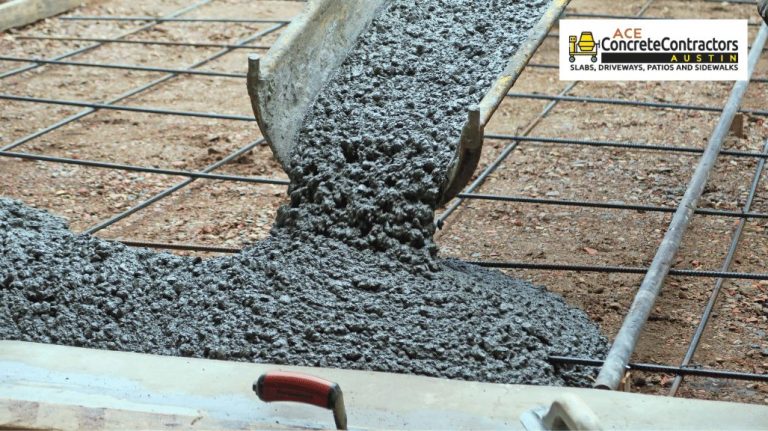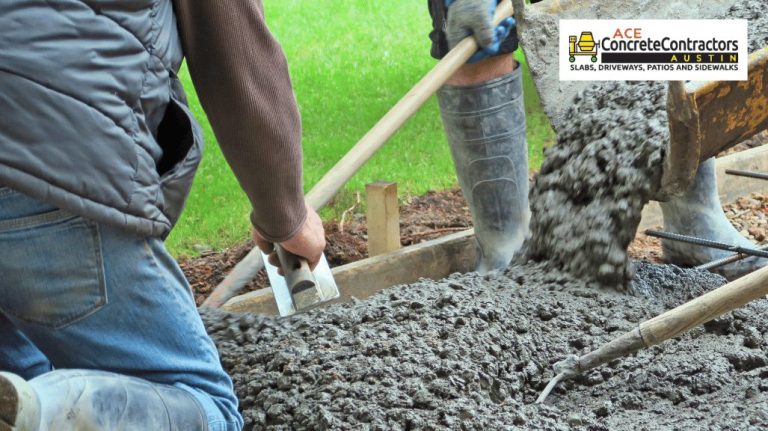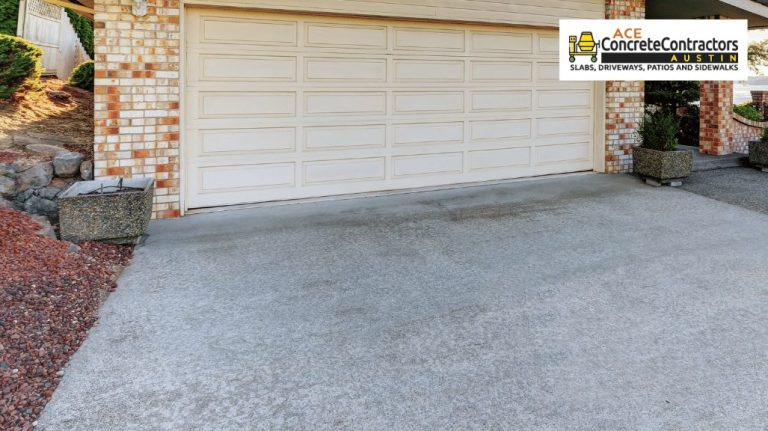Table of Contents
Concrete thickness for driveways often plays the understudy to more glamorous considerations like finish and color. Yet, it holds the key to a driveway’s resilience and functionality. This foundational aspect ensures that your driveway can endure the test of time and usage, marking its importance in driveway construction.
This critical feature distinguishes itself by providing the necessary support for various types of vehicles, resisting weather-induced damage, and enhancing the overall durability of your driveway. The main categories influencing concrete thickness include:
- The soil type beneath the driveway.
- The anticipated load from vehicles.
- The local climate.
- Adherence to building codes.
- Budget considerations.
Each of these categories contributes its unique considerations to the decision-making process.
Going into more detail, the soil type affects how thick the concrete needs to be for stability. Additionally, the weight and type of vehicles that will be using the concrete determine the strength that will be required. Climate is also a factor, as it plays a role in determining the amount of resilience needed to withstand freeze-thaw cycles. Local building codes ensure proper safety measures are followed and all regional standards are met. Finally, budget considerations are considered to balance the ideal with what is achievable, providing a practical perspective on the project.
The subsequent sections will explore these factors in greater depth, shedding light on the nuanced considerations that guide the choice of concrete thickness for driveways. This exploration aims to equip you with a comprehensive understanding of the pivotal role concrete thickness plays in the longevity and effectiveness of your driveway, cementing its status as a crucial element in driveway construction.
Discover the 5 key factors determining the ideal concrete thickness for your driveway in our video guide! 🚗🛣️ https://t.co/aB4Sh0q0Rb #concretedriveway #drivewayconstruction #concretethickness pic.twitter.com/des1uFtI4R
— Ace Concrete Contractors Austin (@aceconcreteatx) April 19, 2024
What is the ideal concrete thickness for driveways?
The ideal concrete thickness for driveways hinges on balancing durability with practical considerations. Typically, a standard thickness of 4 inches is sufficient for passenger vehicles in residential settings. However, for driveways expected to bear heavier loads, such as RVs or commercial vehicles, a thickness of 5 to 6 inches is recommended.
This extra thickness provides the necessary support to prevent cracking and extend the driveway’s lifespan. To determine the most appropriate thickness, you must assess your driveway’s specific needs, including vehicle type and frequency of use. By aligning the concrete thickness with these factors, you ensure a durable, long-lasting surface that meets current and future requirements.
Why is concrete thickness crucial?
Concrete thickness is crucial because it directly impacts the durability and longevity of your driveway. An adequately thickened concrete slab can effectively support the weight of vehicles without succumbing to cracks or surface damage. This thickness is a barrier against the stress and strain of daily use, ensuring that the driveway remains functional and visually appealing over time.
Additionally, the right thickness enhances the driveway’s resilience to environmental factors, such as freeze-thaw cycles, which can cause premature deterioration in thinner slabs. By choosing the appropriate concrete thickness, you safeguard your investment, minimize future repair costs, and extend the usable life of your driveway.
Supports Vehicle Weight Effectively
A driveway with the appropriate thickness is crucial for effectively supporting the weight of various vehicles. This ensures the surface can withstand daily use without succumbing to structural issues like sinking or buckling, common in underprepared driveways.
Prevents Cracks and Surface Damage
Investing in a thicker concrete slab minimizes the cracks and surface damage risk. This resilience is critical to maintaining a smooth and visually appealing driveway, safeguarding it against the wear and tear that can lead to costly repairs.
Enhances Longevity and Durability
Choosing the right thickness for your concrete driveway significantly enhances its longevity and durability. A well-constructed driveway can resist environmental stressors and constant vehicle traffic, ensuring it remains functional and attractive for years with minimal maintenance requirements.
Soil type’s impact on thickness
The soil type beneath a driveway is pivotal in determining the ideal concrete thickness. Clay soils, known for their expansive properties, necessitate a thicker concrete slab to counteract the soil’s tendency to shift and swell, leading to cracking and instability. On the other hand, sandy soils, with their superior drainage capabilities, may require less thickness as they provide a more stable foundation that is less prone to movement.
Understanding your property’s soil characteristics is crucial for deciding on the concrete thickness that will ensure your driveway’s stability and longevity.
Clay Soils Necessitate Thicker Concrete
Due to their expansive nature, clay soils pose a unique challenge, necessitating a thicker concrete slab. This added thickness is crucial to counteract the soil’s tendency to expand and contract, thereby maintaining the stability and integrity of the driveway and minimizing the likelihood of surface cracking.
Sandy Soils May Require Less Thickness
Conversely, sandy soils are characterized by better drainage and a more stable foundation, typically allowing for a thinner concrete layer. Their consistent nature reduces the risk of the driveway shifting or settling, thus ensuring a durable surface with potentially lower material costs.
Driveway usage and thickness
The intended usage of a driveway significantly influences the required concrete thickness. Driveways that anticipate heavy vehicle traffic, such as those used by RVs or commercial trucks, demand a thicker concrete slab to withstand the increased load and prevent structural damage. Conversely, driveways with lighter usage, primarily accommodating passenger vehicles, can maintain integrity and durability with a standard thickness.
This differentiation ensures that the concrete surface is adequately prepared to handle the specific demands, optimizing performance and longevity. Tailoring the thickness to the driveway’s usage enhances its durability and ensures a cost-effective approach to its construction and maintenance.
Heavy Vehicles Need Thicker Concrete
A thicker concrete slab is crucial for driveways that bear the load of heavy vehicles, such as RVs or commercial trucks. This additional thickness is vital to support the increased weight and frequent usage, ensuring the driveway remains free from structural damage and extends its service life.
Light Usage Accommodates Standard Thickness
In contrast, driveways experiencing lighter usage, mainly from passenger vehicles, can maintain optimal functionality with a standard concrete thickness. This approach balances durability and cost-efficiency, ensuring the surface is well-equipped to handle everyday wear and tear without unnecessary material expenditure.
Climate’s influence on concrete thickness
Climate plays a critical role in determining the optimal concrete thickness for driveways. In cold climates, where freeze-thaw cycles are standard, a thicker slab is necessary to withstand the expansion and contraction of the ground. This prevents cracking and surface damage that can compromise the driveway’s integrity.
Conversely, in milder climates, where such cycles are less intense or non-existent, a thinner slab may suffice, as the environmental stress on the concrete is significantly reduced. Understanding the local climate and its effects on concrete is essential for ensuring the longevity and durability of a driveway, making climate consideration a critical factor in planning for concrete thickness.
Cold Climates Demand Thicker Concrete
In regions experiencing cold climates, the necessity for thicker concrete becomes evident. The freeze-thaw cycles characteristic of these areas can severely impact the structural integrity of driveways. A thicker slab provides the resilience needed to combat these conditions, preventing the formation of cracks and ensuring the driveway remains stable and durable over time.
Mild Climates Allow for Thinner Concrete
Conversely, mild climates exert less stress on driveway surfaces, permitting thinner concrete slabs. These environments, essentially free from the harsh freeze-thaw cycles, reduce the risk of weather-related damage. As a result, a thinner layer of concrete can sufficiently maintain the driveway’s integrity and appearance without the need for additional thickness.

Local building codes and thickness
Local building codes are crucial in determining the minimum concrete thickness for driveways. These regulations vary by location, setting specific standards to ensure safety, durability, and compliance with regional construction practices. Adhering to these codes is a legal requirement and a guideline for achieving a driveway that meets safety and quality standards.
In some areas, the codes may also dictate the need for reinforcement within the concrete, such as wire mesh or rebar, further influencing the overall thickness and construction approach. Understanding and following local building codes is essential for any driveway project, as it ensures the finished product is compliant and capable of withstanding its demands.
Minimum Thickness Requirements Vary
The minimum thickness for concrete driveways is not a one-size-fits-all specification; it varies significantly depending on local building codes. These variations reflect different regions’ unique geographical, environmental, and safety considerations, making it essential for homeowners and contractors to consult local regulations before commencing construction.
Reinforcement Requirements by Location
Similarly, the need for reinforcement within a concrete driveway—including wire mesh or rebar—differs by location. Local building codes dictate these requirements to enhance the driveway’s strength and durability, particularly in areas prone to extreme weather conditions or heavy vehicle use. Compliance with these specifications ensures the driveway’s longevity and safety.

Budget considerations for thickness
Budget plays a significant role in determining the thickness of concrete for driveways. Opting for a thicker concrete slab inevitably increases material and labor costs, impacting the project’s overall budget. However, weighing these initial costs against the long-term benefits, such as reduced maintenance and a longer lifespan, can lead to cost savings over time.
Finding the optimal balance between cost and the driveway’s structural needs is key. When deciding on the thickness of their concrete driveway, homeowners should consider not only the immediate financial implications but also the potential for future savings. This approach ensures a durable, cost-effective solution that aligns with financial constraints and usage requirements.
Thicker Concrete Increases Costs
Choosing a thicker concrete slab for your driveway directly influences the project’s cost, leading to higher expenses in both materials and labor. While beneficial for the driveway’s durability and longevity, this decision requires careful consideration of the budget to ensure financial feasibility.
Optimal Balance Between Cost and Need
Finding the optimal balance between the cost implications of thicker concrete and the structural requirements of the driveway is crucial. This balance ensures that homeowners invest in a solution that meets their immediate financial capacity and addresses long-term usage and maintenance expectations, ultimately providing value for money.
Planning for future usage
When deciding on the thickness of your concrete driveway, anticipating future usage plays a pivotal role. Considering potential changes, such as increased vehicle load or the addition of heavy vehicles, can dictate the need for a thicker slab from the outset. This foresight ensures that the driveway remains functional and durable as demands evolve.
Additionally, planning for possible driveway extensions or modifications is essential. A thicker initial pour can accommodate these future enhancements without requiring extensive and costly reconstruction. By incorporating future usage into the planning phase, homeowners can create a versatile and long-lasting driveway solution that adapts to changing needs and usage patterns, safeguarding their investment over time.
Anticipating Increased Vehicle Load
Planning for a driveway that can accommodate an increased vehicle load is crucial. Whether due to acquiring heavier vehicles or increased traffic, a thicker concrete slab ensures the driveway can handle additional stress without compromising its integrity or requiring premature repairs.
Considering Potential Driveway Extensions
Future modifications, like driveway extensions or enhancements, should also influence the initial planning. Opting for a thicker base from the start provides the flexibility to expand or alter the driveway later on without the need for significant structural adjustments, ensuring a smooth transition and cost-effective updates.

Environmental considerations
Environmental considerations are increasingly important in planning and constructing concrete driveways. Opting for permeable concrete options can significantly enhance water drainage and reduce runoff, mitigating the impact on local water systems. Additionally, the carbon footprint of concrete production is a critical factor; thus, selecting materials and methods that minimize environmental harm is essential.
By incorporating these considerations, homeowners can contribute to a more sustainable approach to driveway construction, ensuring their project aligns with broader environmental protection goals while achieving a durable and functional result.
Permeable Options for Water Drainage
Choosing permeable concrete for driveways is a strategic decision that benefits both the property and the environment. This option allows rainwater to filter through the surface, significantly reducing runoff and promoting natural groundwater replenishment. It’s an effective way to manage water drainage while minimizing the environmental impact.
Impact of Concrete Production on Carbon Footprint
Concrete production contributes to carbon emissions, impacting the global carbon footprint. By selecting low-carbon concrete options or incorporating sustainable materials in the mix, homeowners can lessen the environmental impact of their driveway projects. This approach not only aids in reducing greenhouse gas emissions but also supports broader sustainability goals.
Maintenance and repair implications
A concrete driveway’s thickness directly affects its maintenance and repair needs. Thicker driveways tend to have lower maintenance costs over time, as their robust structure is less prone to cracking and damage from heavy use or environmental factors. This can lead to significant savings on repair and upkeep in the long run.
On the other hand, standard-thickness driveways may be more accessible and less costly to repair due to their more common construction specifications. However, they might require more frequent attention to maintain their condition. Balancing the initial investment in thickness with the anticipated maintenance and repair implications is essential for homeowners.
This approach ensures a cost-effective, durable driveway solution that aligns with the property’s needs and usage patterns.
Thicker Driveways Reduce Maintenance Costs
Thicker driveways are designed to withstand the rigors of heavy use and environmental pressures, significantly reducing their susceptibility to damage. This durability translates into lower maintenance costs, as the need for frequent repairs is minimized. Homeowners investing in a thicker concrete slab can expect a more resilient driveway that maintains its condition over time, offering long-term savings.
Easier Repair of Standard Thickness Driveways
While standard-thickness driveways may require more regular maintenance, they benefit from easier and often less expensive repair processes. The materials and methods for repairing standard-thickness slabs are widely available and well-understood within the industry, making it a straightforward task for professionals. This accessibility can be advantageous for addressing wear and tear efficiently, ensuring the driveway remains in good condition.
Frequently Asked Questions
What role does vehicle weight play in determining concrete thickness for driveways?
Vehicle weight significantly influences the required concrete thickness. Heavier vehicles necessitate a thicker concrete slab to withstand the increased load and prevent cracking.
How does soil type affect the ideal concrete thickness for driveways?
Soil type impacts concrete thickness by determining the load-bearing capacity of the ground. Soils with poor compaction or drainage require a thicker concrete slab to ensure stability and longevity.
What is the importance of climate in deciding the concrete thickness for driveways?
Climate influences concrete thickness through its effect on expansion and contraction. Regions with extreme temperature fluctuations need thicker concrete to mitigate the risk of cracking due to thermal movement.
Does the intended use of the driveway alter the necessary concrete thickness?
Yes, the intended use of the driveway, such as frequent heavy vehicle traffic or commercial use, demands a thicker concrete slab to accommodate the increased wear and tear.
How does the presence of trees near a driveway impact concrete thickness requirements?
Trees near a driveway can necessitate a thicker concrete slab due to potential root growth that may cause cracking or displacement, requiring additional thickness for durability.
